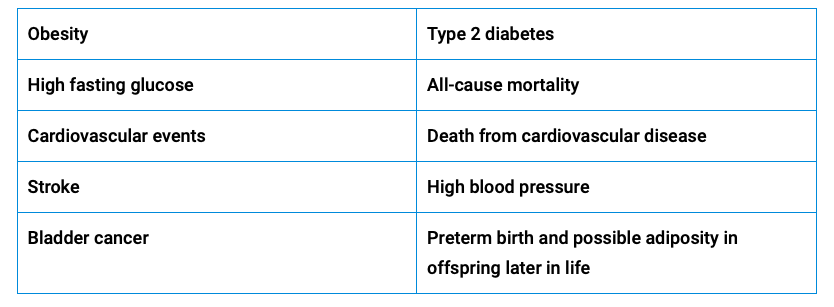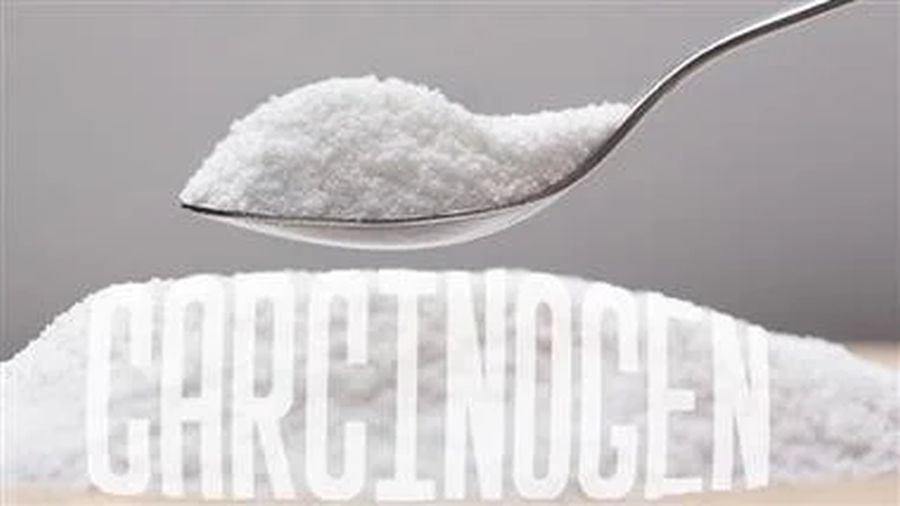Top Sweetener Officially Declared a Carcinogen
The World Health Organization has finally gotten around to declaring the popular artificial sweetener aspartame a potential carcinogen
The ruling comes from sources with WHO’s International Agency for Research on Cancer (IARC), who said aspartame will be listed as “possibly carcinogenic to humans” in July 2023
I’ve been warning about aspartame’s cancer-causing potential since 2010, so you can see just how long this danger has been known
For over a decade, researchers have been warning of aspartame’s neurotoxicity and carcinogenicity, stating reevaluation of aspartame consumption is “urgent and cannot be delayed”
A 2022 large-scale cohort study found people who consumed higher levels of artificial sweeteners had higher risk of overall cancer compared to non-consumers
*
The World Health Organization has finally gotten around to declaring the popular artificial sweetener aspartame a potential carcinogen.1 I warned about aspartame’s cancer-causing potential on my site over 25 years ago, in my best-selling book, “Sweet Deception: Why Splenda, NutraSweet, and the FDA May Be Hazardous to Your Health,” in 2006, and in an article I wrote for The Huffington Post.2 It’s since been deleted — but you can see just how long this danger has been known.
The ruling comes from sources with WHO’s International Agency for Research on Cancer (IARC), who said aspartame will be listed as “possibly carcinogenic to humans” in July 2023.3 Additional findings from the Joint WHO and Food and Agriculture Organization’s Expert Committee on Food Additives (JECFA), which is in the process of updating its aspartame risk assessment, are also expected.4
Donald Rumsfeld’s Hand in Aspartame’s Approval
JECFA has vouched for aspartame’s safety for decades, stating since 1981 that it’s safe when consumed within accepted daily limits.5 It was 1981 when the U.S. Food and Drug Administration first approved aspartame.6 At the time, the late Donald Rumsfeld, former U.S. secretary of defense, was chairman of G.D. Searle, aspartame’s manufacturer, and he was reportedly instrumental in its approval.
At a 1980 FDA Board of Inquiry, the FDA had refused to approve aspartame due to concerns that it could induce brain tumors.7 The late John Olney, a renowned neuroscientist who tried to prevent aspartame’s approval, also wrote a letter to the Board of Inquiry in 1987, warning of aspartame’s neurotoxicity, including the potential for brain tumors and damage to children’s brains.8 As reported by Rense.com:9
“The FDA had actually banned aspartame based on this finding, only to have Searle Chairman Donald Rumsfeld … vow to ‘call in his markers,’10 to get it approved.
On January 21, 1981, the day after Ronald Reagan’s inauguration, Searle re-applied to the FDA for approval to use aspartame in food sweetener, and Reagan’s new FDA commissioner, Arthur Hayes Hull, Jr., appointed a 5-person Scientific Commission to review the board of inquiry’s decision.
It soon became clear that the panel would uphold the ban by a 3-2 decision, but Hull then installed a sixth member on the commission, and the vote became deadlocked. He then personally broke the tie in aspartame’s favor.
Hull later left the FDA under allegations of impropriety, served briefly as Provost at New York Medical College, and then took a position with Burston-Marsteller, the chief public relations firm for both Monsanto and GD Searle.”
Aspartame’s Cancer Link Known for Decades
Despite aspartame’s approval, by 1987 a series of investigative reports raised concerns that the chemical’s approval was mired by conflicts of interest, poor quality industry-funded research and revolving-door relationships between the FDA and the food industry.11
By 1996, a team with the department of psychiatry at Washington University Medical School questioned whether increasing brain tumor rates had an aspartame connection. “An exceedingly high incidence of brain tumors” has been identified in aspartame-fed rats compared to rats not fed aspartame, they explained, adding:12
“Compared to other environmental factors putatively linked to brain tumors, the artificial sweetener aspartame is a promising candidate to explain the recent increase in incidence and degree of malignancy of brain tumors.”
Then, in 2006, a study led by Dr. Morando Soffritti, a cancer researcher from Italy who’s the head of the European Ramazzini Foundation of Oncology and Environmental Sciences, found that, even in low doses, animals were developing several different forms of cancer when fed aspartame.13
That year, the team concluded aspartame was a “multipotential carcinogenic agent, even at a daily dose of 20 mg/kg body weight, much less than the current acceptable daily intake” and stated a reevaluation of aspartame consumption was “urgent and cannot be delayed.”14
A 2007 follow-up study confirmed the findings of aspartame’s “multipotential carcinogenicity,” even at doses close to the acceptable daily intake for humans. Further, it also demonstrated that when lifespan exposure beginning in utero was assessed, aspartame’s “carcinogenic effects are increased.”15 In 2010, Soffritti and colleagues again warned that aspartame was a carcinogenic agent in rats and mice.16
Research Supporting Aspartame’s Carcinogenicity Is Widespread
These studies were only the beginning of the evidence showing aspartame’s cancer-causing potential. In 2012, Harvard researchers published a study in The American Journal of Clinical Nutrition, which found:17
“In the most comprehensive long-term epidemiologic study, to our knowledge, to evaluate the association between aspartame intake and cancer risk in humans, we observed a positive association between diet soda and total aspartame intake and risks of NHL [non-Hodgkin lymphoma] and multiple myeloma in men and leukemia in both men and women.”
Adding further concerns over aspartame’s safety, U.S. Right to Know reported:18
“In a 2014 commentary in American Journal of Industrial Medicine,19 the [Cesare] Maltoni [Cancer Research] Center researchers wrote that the studies submitted by G. D. Searle for market approval ‘do not provide adequate scientific support for [aspartame’s] safety.
In contrast, recent results of life-span carcinogenicity bioassays on rats and mice published in peer-reviewed journals, and a prospective epidemiological study, provide consistent evidence of [aspartame’s] carcinogenic potential.’”
A 2020 study further supports the Ramazzini Institute’s (RI) original findings, revealing a statistically significant increase in total hematopoietic and lymphoid tissue tumors (HLTs) and total leukemias and lymphomas in female rats exposed to aspartame.
“After the HLT cases re-evaluation, the results obtained are consistent with those reported in the previous RI publication and reinforce the hypothesis that APM [aspartame] has a leukemogenic and lymphomatogenic effect,” the researchers explained.20
Again in 2021, a review of the Ramazzini Institute data further confirmed that aspartame is carcinogenic in rodents. The researchers noted that their findings “confirm the very worrisome finding that prenatal exposure to aspartame increases cancer risk in rodent offspring. They validate the conclusions of the original RI studies.”21
In response, they called on national and international public health agencies to reexamine aspartame’s health risks, particularly prenatal and early postnatal exposures.22
Consuming Artificial Sweeteners Increases Cancer Risks by 13%
In a 2022 study of 102,865 adults from France, published in PLOS Medicine, dietary intakes and consumption of artificial sweeteners were obtained and analyzed for associations with cancer incidence. The large-scale cohort study found that people who consumed higher levels of artificial sweeteners had a higher risk of overall cancer compared to non-consumers.23
Among the artificial sweeteners studied, aspartame and acesulfame-K, in particular, were associated with increased cancer risk, while aspartame intake was linked to higher risks of breast cancer and obesity-related cancers, including stomach, liver, colon and rectal cancers.
Specifically, total cancer risks increased by 13% among artificial sweetener consumers, while the risk of breast cancer rose by 22% and the risk of obesity-related cancers increased up to 15%.24 “These results suggest that artificial sweeteners, used in many food and beverage brands worldwide, may represent a modifiable risk factor for cancer prevention,” the researchers noted,25 explaining:
“[E]xperts have urged for a re-evaluation by public health authorities of aspartame’s role in cancer development, based on previous and recent findings in animal models, in vitro studies, and, to a lesser extent, human data. Findings about other artificial sweeteners also raise questions regarding their potential role in carcinogenesis based on in vivo studies.”
WHO Warns Against Artificial Sweeteners for Weight Control
Aspartame’s cancer link is especially concerning given its prevalence in diet foods and drinks. Aspartame is used in 1,400 food products in France and more than 6,000 products around the globe. The chemical is commonly found in food products such as sugar-free gum, diet drink mixes and sodas, reduced-sugar condiments and tabletop sweeteners, including Equal and NutraSweet.26
Its high level of sweetness — 200 times greater than sugar27 — and low calories makes it popular among people looking to make their drinks and meals sweeter without the calories of a comparable amount of sugar.
But, in addition to labeling the artificial sweetener as possibly carcinogenic, in May 2023, even the beyond-corrupted WHO released a guideline advising not to use non-sugar sweeteners (NSS) for weight control because they don’t offer any long-term benefit in reducing body fat in adults or children.28
Previously, WHO conducted a systematic review and meta-analysis that revealed “there is no clear consensus on whether non-sugar sweeteners are effective for long-term weight loss or maintenance, or if they are linked to other long-term health effects at intakes within the ADI.”29
The systematic review also suggested “potential undesirable effects from long-term use of NSS, such as an increased risk of type 2 diabetes, cardiovascular diseases, and mortality in adults.” Even cancer was called out in analysis, which included 283 studies and found artificial sweeteners are linked to an increased risk of:30

Further, according to the WHO study:31
“Mechanisms by which NSS as a class of molecules might exert effects that increase risk for obesity and certain NCDs [non-communicable diseases] have been reviewed extensively and include interaction with extra-oral taste receptors, possibly with alteration of the gut microbiome.
Because sugars and all known NSS presumably elicit sweet taste through the TAS1R heterodimeric sweet-taste receptor, which has been identified not just in the oral cavity but in other glucose-sensing tissues, it is not surprising that such a group of vastly different chemical entities could be responsible for similar effects on health.”
Artificial Sweeteners Aren’t Worth the Risk
It’s unclear why WHO is suddenly warning the public about these products, when they’ve been promoted by health officials for so long. But I’ve been advising against their use from the start. Often, there are emotional drivers behind cravings for sweets, which is why I’ve long recommended learning the Emotional Freedom Techniques (EFT) a psychological acupressure tool, to overcome them.
Beyond tackling your underlying emotions to stave off the urge to consume poisonous artificial sweeteners, consider keeping a stash of ripe fruit that can naturally fill these cravings. Additionally, if you are eating a high fat diet over 30%, then you will want to limit your carbs. But, if it is below 30% and you are metabolically flexible, you will likely increase your health by having a few hundred grams of ripe fruit.
Notes
1, 3, 5 Reuters June 29, 2023
2 Internet Archive, Wayback Machine, The Huffington Post July 8, 2010
4 WHO, IARC, Aspartame Questions and Answers June 26, 2023
6, 11, 18 U.S. Right to Know July 3, 2023
7, 9 Rense.com, How Aspartame Became Legal – The Timeline
8 SCRIBD, Dr. John Olney Statement Aspartame – l987
10 News With Views May 9, 2004
12 J Neuropathol Exp Neurol. 1996 Nov;55(11):1115-23
13, 14 Environ Health Perspect. 2006 Mar;114(3):379-85
15 Environ Health Perspect. 2007 Sep;115(9):1293-7. doi: 10.1289/ehp.10271
16 Am J Ind Med. 2010 Dec;53(12):1197-206. doi: 10.1002/ajim.20896
17 The American Journal of Clinical Nutrition December 2012, Volume 96, Issue 6, P1419-1428
19 Am J Ind Med. 2014 Apr;57(4):383-97. doi: 10.1002/ajim.22296. Epub 2014 Jan 16
20 Acta Histochem. 2020 Jul;122(5):151548. doi: 10.1016/j.acthis.2020.151548. Epub 2020 May 20
21, 22 Environmental Health volume 20, Article number: 42 (2021)
23, 25, 27 PLOS Medicine March 24, 2022
30 WHO April 12, 2022, Executive Summary
31 WHO April 12, 2022, Executive Discussion







